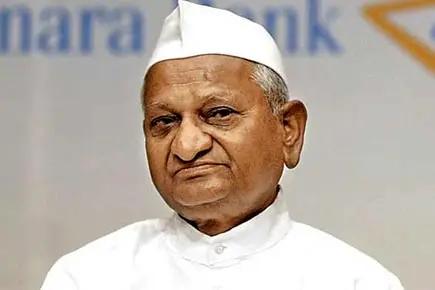Hazare recalled his agitation against corruption during Singh's tenure in the early 2010s. The former PM invited him for talks and took quick decisions, said the octogenarian activist

File pic
Anti-corruption activist Anna Hazare on Friday condoled the death of former Prime Minister Manmohan Singh, saying he always "prioritised the welfare of the country and society", news agency PTI reported.
"Those who are born have to die, but some leave memories and their legacy behind. Singh gave a new direction to the country's economy," Hazare told PTI in his hometown in Ahilyanagar district of Maharashtra.
Recalling his agitation against corruption during Singh's tenure in the early 2010s, the octogenarian activist said the former prime minister invited him for talks and took quick decisions.
"He was against corruption and took immediate decisions concerning the Lokpal and Lokayukta Act. He always thought about the country and how best he could work for its people," Hazare said.
According to PTI, the activist also said that Singh, who was the PM from 2004 to 2014, gave a new direction to the country's economy and brought it on the path of development. "Manmohan Singh has left the world in physical form but will always remain in memories," he added.
Manmohan Singh, who was instrumental in making India an economic powerhouse, passed away at the All India Institute of Medical Sciences (AIIMS), Delhi, on Thursday night at age 92.
'Manmohan Singh was committed to idea of accountability, transparency'
Former Prime Minister Manmohan Singh, who ushered in an era of transparency, accountability and democratic empowerment with the implementation of the Right to Information (RTI) Act, 2005, was a little "uncertain about its impact" on government functioning, but was committed to the idea of "accountability and transparency", RTI activists and former information commissioners said.
The Act gave citizens the power to seek information from the government for a payment of Rs 10, ending decades of secrecy in government functioning.
"He told me he was a little uncertain about the impact of RTI on government functioning. Normal scenes of bureaucracy. He was a true bureaucrat who understood the importance of secrecy in the government. So he was a little apprehensive, but he was committed to the idea of accountability and transparency," the country's first chief information commissioner, Wajahat Habibullah, told PTI, adding that the former prime minister was certain that the Central Information Commission (CIC) should be led by a person from the civil service for the simple reason that he would understand the functioning of the government and know what kind of information can be disclosed and what should be withheld.
(With PTI inputs)
 Subscribe today by clicking the link and stay updated with the latest news!" Click here!
Subscribe today by clicking the link and stay updated with the latest news!" Click here!










